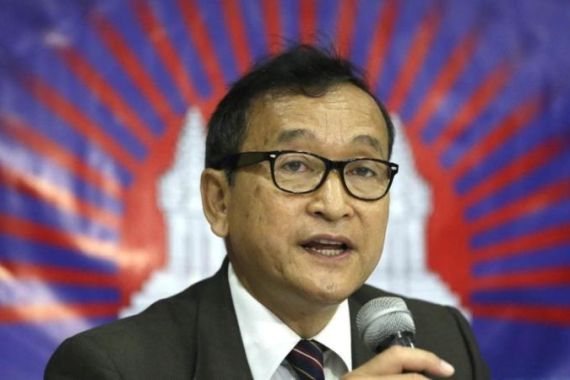Cambodian opposition leader pardoned by king
Royal decree paves way for self-exiled Sam Rainsy to return home and campaign in upcoming general election.

Cambodian opposition leader Sam Rainsy has been pardoned by the country’s monarch, King Norodom Sihamoni, clearing the way for the self-exiled politician to return home and campaign in the upcoming general election.
A copy of the pardon, signed by the king, was shown to several news outlets on Friday.
Rainsy has lived abroad since 2009 to avoid prison on charges widely seen as politically motivated. It was not immediately clear if he would be able to run in the July 28 polls.
The pardon was requested by Prime Minister Hun Sen. He wrote in a letter to the king that the pardon should be granted “in the spirit of national reconciliation, national unity and to make sure the national election process is conducted under the principal of democracy with freedom and pluralism and jointly by all involved parties”.’
The request came after the United States and others said the exclusion of Rainsy from elections called into question the polls’ legitimacy. US legislators called for the US to cut off aid to Cambodia unless Hun Sen allowed a free vote.
Hun Sen, who is one of Southeast Asia’s longest-serving leaders, is expected to extend his 28-year rule in the election.
‘Welcome back’
Hun Sen’s cabinet spokesman Phay Siphan said the pardon had nothing to do with the election or international pressure.
“The prime minister did it for the sake of the country and in the spirit of national reconciliation,” he said. “Sam Rainsy is free now; he can come back to Cambodia. We welcome him back.”
Rainsy, president of the Cambodia National Rescue Party (CNRP), wrote to King Sihamoni in June requesting a pardon and also announced his intention to return to Cambodia last Sunday, in a letter to the international community.
“He is preparing to return to Cambodia very soon,” a spokesman for the opposition CNRP, Yim Sovann, told the AFP news agency.
The government had warned that he could face arrest on arriving back in the country.
Rainsy was sentenced in 2010 to two years in jail for uprooting border markers with Vietnam. He was also sentenced to 10 years in prison for spreading false information about the border dispute.
Critics called both cases examples of the government’s use of the courts to intimidate opponents.